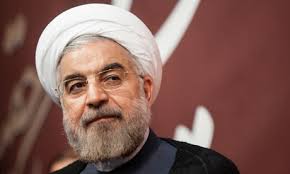 Iranian presidential candidate Hassan Rohani’s chances were boosted after two former presidents open to engagement with the West endorsed him in the June 14 election.
Iranian presidential candidate Hassan Rohani’s chances were boosted after two former presidents open to engagement with the West endorsed him in the June 14 election.
Both Ali Akbar Hashemi Rafsanjani and Mohammad Khatami said yesterday they would vote for Rohani. Iranians “seeking a positive evolution in politics, culture, economy and foreign policy can make a decision toward a better future for society,” Khatami wrote on his website.
Both former presidents have expressed sympathy with the 2009 opposition movement, which accused authorities of ballot fraud to deny a reformist candidate victory.
Rohani’s campaign also received a push after Mohammad Reza Aref, a candidate who served as a vice president in Khatami’s administration, stepped down two days ago to clear the way for Rohani. Both men had campaigned as reformists.
Rohani, a cleric who was a chief negotiator in talks on Iran’s nuclear program during Khatami’s presidency, has been campaigning for more media freedom and an easing of social restrictions. He also said he will seek to steer the nation away from the confrontational path with the West taken by President Mahmoud Ahmadinejad, who is ineligible to run for a third consecutive term.
Second Round
Polls suggest the contest will go to a second round.
Six candidates remain in the race, after ex-parliamentary speaker Gholam-Ali Haddad Adel dropped out on June 10 in an effort to prevent the dilution of votes for conservative contenders. These include Tehran Mayor Mohammad Baqer Qalibaf, Saeed Jalili, the current chief nuclear negotiator and former foreign minister Ali Akbar Velayati, a close adviser to Ayatollah Ali Khamenei, the nation’s supreme leader.
If no candidate gets a majority in the first round, the top two will compete in a June 21 runoff.
According to two different local polls cited by state-run Mehr and Fars, none of the six candidates will win a majority of votes this week.
Qalibaf will place first with 17.8 percent while Rohani will come in second with 14.6 percent, according to the Mehr Center For Opinion Polling’s survey. Jalili will trail with 9.8 percent, it showed.
Qalibaf and Jalili will lead votes and Rohani will come in third, according to another survey Fars cited yesterday.
Outcome Unclear
“One of the few saving graces of the Iranian political system is that despite the on-going effort to centralize everything, when it comes to these sorts of elections, the outcome is hardly pre-ordained,” Daniel Brumberg, co-director of democracy and governance studies at Georgetown University’s Government Department, said in an interview from Washington.
Opposition from Khamenei may cause Rohani to fall short in his presidential bid, said Alireza Nader, a senior analyst in the Arlington, Virginia, office of the Rand Corporation, a research group. “It is not clear Khamenei has decided who he wants to be president,” Nader said. “He doesn’t want Rohani to win.”
About 51 percent of Iranians are undecided or said they will not vote at all, said Akbar Torkan, the deputy head of Rohani’s campaign headquarters, citing local polls. Torkan said he expected Khatami’s support to boost participation, according to the report published yesterday by the state-run Iranian Students News Agency.
Jalili has called for “resistance” in the face of foreign powers’ sanctions against Iran over its nuclear program. Rohani, who also backs Iran’s right to a civilian nuclear program, has said technological progress shouldn’t come at the expense of the economy.
Business Week

Leave a Reply
You must be logged in to post a comment.